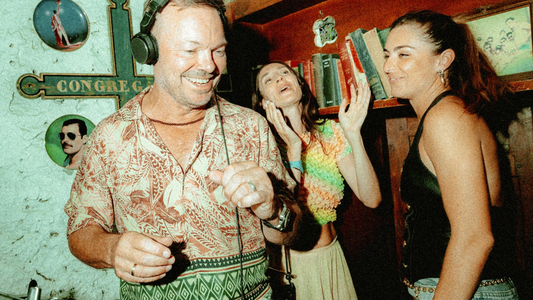
DJ Sprinkles – Midtown 120 Blues (2009)
By Rafi Mercer
A faint hiss, a throb of bass, and then a deep, pulsing kick. The sound is house, unmistakably. But layered over it comes a voice — spoken, calm, reflective. Terre Thaemlitz, the artist behind DJ Sprinkles, tells us: “House music is not universal. House music is coded. House music is queer.” From its very first track, Midtown 120 Blues, released in 2009, refuses to treat house as mere dancefloor function. Instead, it reframes it as history, testimony, and politics — a diary of nightlife where survival and identity are inscribed in every beat.
Thaemlitz, a trans woman, DJ, producer, and writer, had long explored the intersections of music, identity, and critique. With Midtown 120 Blues, she created what many consider the definitive deep house album of the 21st century. It is not flashy, not designed for peak-time euphoria. Its tempos are restrained, its textures warm but melancholic. Across nearly 80 minutes, it builds a world of slow grooves, whispered narratives, and deep resonance — music for listening as much as dancing.
The opening track, “Midtown 120 Intro,” lays out the thesis: house was born in the queer, Black, and Latino clubs of New York, Chicago, and beyond. It was survival music, coded language, community ritual. To strip it of that context, to treat it as neutral hedonism, is to erase its roots. The album insists on memory.
From there, tracks like “House Music Is Controllable Desire You Can Own” unfold with deep basslines, warm chords, and hypnotic repetition. The groove is irresistible, but beneath it lies melancholy. “Ball’r (Madonna Free Zone)” is both playful and pointed, reclaiming space for house away from pop appropriation. “Brenda’s $20 Dilemma” slows things further, its groove so deep it feels subterranean.
What makes the album extraordinary is its refusal of spectacle. This is not house for festival stages or luxury clubs. It is house for basements, for after-hours, for spaces where people gather not only to dance but to exist, to breathe, to endure. The beats are steady, the textures enveloping, the mood introspective. It is music that insists on slowness, on depth, on listening.
Culturally, the album was revelatory. In 2009, much of house music was dominated by commercial spectacle — big-room anthems, superstar DJs, corporate festivals. Midtown 120 Blues cut against that grain, reminding listeners of house’s origins as queer underground expression. It spoke directly to those communities while also educating outsiders willing to listen. Critics hailed it, and it quickly became a cult classic, revered not for flash but for truth.
Listening today, the album remains deeply inclusive. Its grooves are accessible — anyone can move to them. But its narratives remind us of whose grooves these are, of whose histories they carry. It is generous without being naïve, welcoming without erasing difference. Women, men, queer, straight, seasoned house heads or curious newcomers: all are invited, but asked to listen with respect.
On vinyl, the record is immersive. The warmth of the pressing amplifies the bass, the hiss of surface noise blending with the album’s intimate atmospheres. The act of flipping sides reinforces its pacing, its patience. The cover art — abstract, minimal — mirrors the music’s depth: surface simplicity hiding layers of meaning.
What endures about Midtown 120 Blues is its honesty. Thaemlitz refuses to romanticise house as escapism alone. She reminds us it is also labour, survival, code. The beats are beautiful, yes, but they are also freighted with history. This makes the record more than a deep house classic. It makes it testimony — to lives lived, struggles endured, communities sustained.
To play it today is to hear house music differently. The bass pulses, the chords shimmer, the voice whispers truth. You dance, yes, but you also reflect. You remember. And in that remembering, the music becomes not just groove but ritual, not just pleasure but politics, not just sound but solidarity.
Rafi Mercer writes about the spaces where music matters. For more stories from Tracks & Tales, subscribe, or click here to read more.







